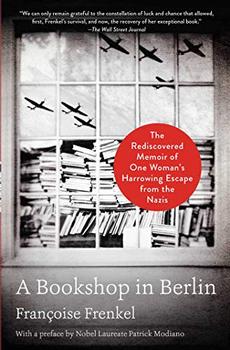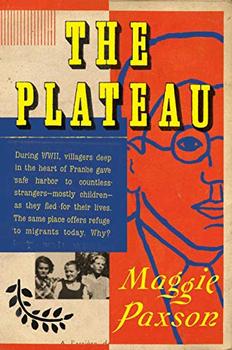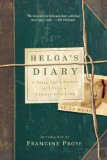Summary | Excerpt | Reviews | Beyond the book | Read-Alikes | Genres & Themes | Author Bio

The Rediscovered Memoir of One Woman's Harrowing Escape from the Nazis
by Francoise FrenkelIn A Bookshop in Berlin, Francoise Frenkel narrates her struggle to survive World War II as a refugee. Born in Poland in 1889 but living in Berlin at the outbreak of the war, Frenkel eventually made her way to safety in Switzerland, and from there wrote her memoir, originally titled No Place to Lay One's Head. It was published in 1945, but few copies were produced and it was largely lost to history before being rediscovered during an attic decluttering in southern France in 2010. The book was brought to an Emmaus Companions charity sale, where—by happenstance—Nobel Prize-winning novelist Patrick Modiano acquired it. This book is Frenkel's story in her own words, renamed, translated and republished.
The book opens with Frenkel's reflections on why she became a bookseller, rooted in a long-held appreciation for books that will be familiar to many readers. When studying in Paris at the Sorbonne, Frenkel's adoration of French culture collided with her love for all things literary. These passions driving her, Frenkel boldly opened up the first and only French-language bookshop in Berlin, "La Maison du Livre Francais." The shop attracted diplomats, authors, artists, celebrities, teachers, students and thinkers, uniting those who appreciated French culture in Germany's capital. It was a celebrated place where people could hold cultural meetings, engage in debate, recite poetry, play music and perform theater. But as WWII encroached, being a foreign-born Jewish business owner associated with restricted books was a great risk.
In 1938, Nazi leaders executed a violent pogrom across major cities to intimidate Jewish people in Germany, destroying Jewish-owned synagogues, homes and businesses. After this attack—often referred to as "Kristallnacht," or the Night of Broken Glass—friends convinced Frenkel to go abroad to secure her safety. Although heartbroken to abandon the bookshop she had nurtured and grown for 17 years, Frenkel made her way to Paris. She had no idea where the war would end up taking her.
Frenkel's personal account is broken up into chapters based on each major move she made leading up to and throughout the war. Much of it unfolds in France—including Paris, Avignon, Vichy, Nice, Grenoble, Annecy and Saint-Julien. In many ways, France is the centering force in the memoir. The original edition was even published in French, even though it was not Frenkel's mother tongue. In this story of survival and escape, Frenkel is in search of safety, but she is one of the "hunted souls," unwelcome within the borders of both Germany and occupied France, but forbidden to flee elsewhere.
Despite her ordeal, Frenkel has a remarkably grateful spirit. She chooses to emphasize the kindness of strangers and friends that made her survival possible: Monsieur and Madame Marius of Nice who let her stay with them, provided her with necessities, and connected her to friends abroad; Madame Lucienne, who, despite her trust in the government and devotion to civil service, took Frenkel in for a brief period of time; Monsieur Jean Letellier, the architect and ex-serviceman who accompanied her to the outskirts of the Swiss border. As Frenkel describes it, the empathy of others who disregarded danger in service to her welfare was what allowed her escape: "I was the beneficiary of one generous gesture after another." Even discussing the xenophobic and anti-Semitic—from townspeople to prison guards to soldiers—Frenkel's words are void of resentment, sometimes even sympathetic.
Frenkel's memoir feels unfinished in a number of ways. For example, she hardly mentions her husband, Simon Raichenstein, a choice that feels out of place given that she regularly expresses her desire to reconnect with family, including her mother and cousins, who she hopes are safely strewn across Europe. Historians have confirmed that Raichenstein died in Auschwitz in August of 1942. Perhaps it was a point of trauma too miserable for the author to examine in her memoir. Another unfinished feature is the book's conclusion. It stops abruptly, right as she crosses the Swiss border to safety. As a result, Frenkel's life post-war is a mystery. However, what we do know of her story serves as a reminder not to forget the terror of the Holocaust and how ordinary people were affected by it.
Frenkel succeeds in sharing an unusual, beautiful type of war story, one that is far less graphic and brutal than many others the reader may have encountered. Instead of violence, she turns her attention to the goodness that can illuminate dark times, the small and large acts of resistance that webbed together to shield her through years of dislocation and eventually helped her to safety.
![]() This review was originally published in The BookBrowse Review in January 2020, and has been updated for the
August 2020 edition.
Click here to go to this issue.
This review was originally published in The BookBrowse Review in January 2020, and has been updated for the
August 2020 edition.
Click here to go to this issue.

If you liked A Bookshop in Berlin, try these:

by Maggie Paxson
Published 2019
During World War II, French villagers offered safe harbor to countless strangers - mostly children - as they fled for their lives. The same place offers refuge to migrants today. Why?

by Helga Weiss
Published 2014
The remarkable diary of a young girl who survived the Holocaust—appearing in English for the first time.






Your guide toexceptional books
BookBrowse seeks out and recommends the best in contemporary fiction and nonfiction—books that not only engage and entertain but also deepen our understanding of ourselves and the world around us.